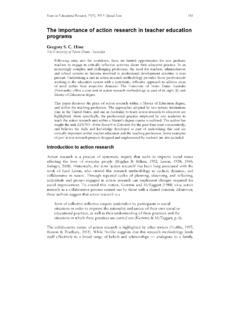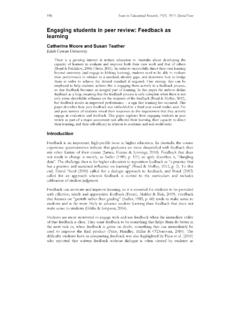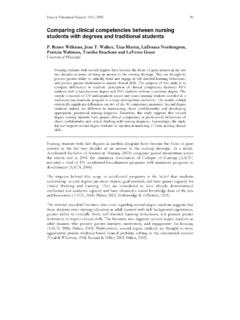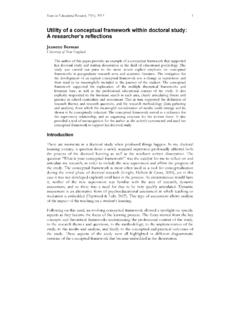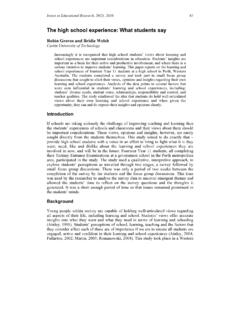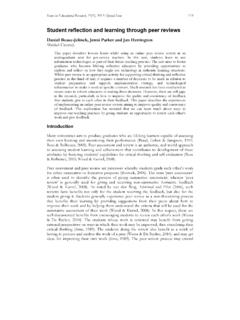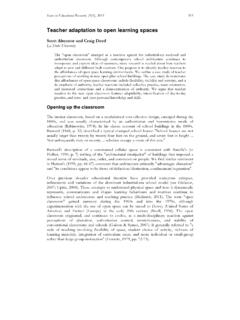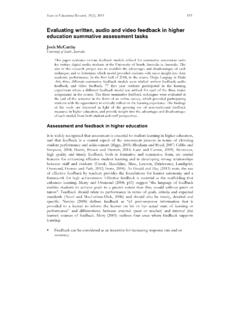Transcription of Educational support for orphans and vulnerable …
1 Issues in Educational research , 26(1), 2016 82 Educational support for orphans and vulnerable children in primary schools: challenges and interventions Teresa Mwoma Kenyatta University, Kenya Jace Pillay University of Johannesburg, South Africa Educational status is an important indicator of children s wellbeing and future life opportunities. It can predict growth potential and economic viability of a state. While this is an ideal situation for all children, the case may be different for orphans and vulnerable children (OVC) due to the challenges they go through on a daily basis.
2 This article aims to advance a debate on the findings of our study on the Educational support provided for OVC through a critical engagement on the challenges experienced and the intervention measures to be taken in South African public primary schools context. The study involved one hundred and seven participants comprising sixty five OVC and forty two teachers. Questionnaires with structured and unstructured questions were utilised to collect descriptive and qualitative data. Findings suggest that, although the South African Government has put mechanisms in place to support OVC attain basic education, numerous challenges were found to be hindering some OVC from attaining quality education.
3 Based on the findings, several intervention measures have been suggested. Introduction According to the United Nations Millennium Development Goals evaluation report 2013 Sub-Saharan Africa has the highest rate of children leaving school early in the world with slightly more than two out of five children who started primary school in 2010 who will not make it into the last grade (UN, 2013, ). While it is not clear from the report why many children would leave school early, poverty and the effects of HIV/AIDS have been known to play a big role in children leaving school early especially in Sub-Saharan Africa.
4 This is a worrying trend that calls for attention from all stakeholders in education to ensure that children at risk of dropping out of school are supported to complete their primary schooling. UNICEF (2009) maintains that addressing the Educational rights and needs of OVC in Sub-Saharan Africa presents new opportunities and challenges that need attention. With the abolition of school fees in public primary schools in Sub-Saharan Africa, many children are enrolled in schools. However, the number of OVC has increased presenting new challenges in handling the large numbers and in addressing their Educational rights and needs (UNICEF, 2009).
5 Due to HIV/AIDS the traditional structure of households is changing in affected communities, leaving vulnerable children to adapt to non-traditional families and poverty (Ebersohn & Eloff, 2002). Ebersohn and Eloff note that when parents die, some orphans are left under the care of aged grandparents or under older siblings to care for them. This arrangement however may negatively influence the schooling status of affected children. Mwoma & Pillay 83 Fleming (2015) pointed out that OVC in countries with many cases of HIV/AIDS experienced discrimination in accessing education and healthcare as orphanhood is associated with HIV/AIDS.
6 Fleming further argued that maternal and double orphans are more discriminated against in accessing education than paternal orphans (Fleming, 2015; Case et al, 2004). Such orphans experience financial constraints which further disadvantage them as they cannot afford the cost of education related materials. vulnerable children from child headed households are burdened with domestic and economic responsibilities, which in turn affect their participation in education in relation to attending and succeeding in school (Fleming, 2015). As the number of OVC grows, communities become less and less capable of addressing all their basic needs, including their ability to go to school (UNICEF, 2009).
7 Lack of support in education by parents/guardians will have a direct influence on how OVC perform in education (Mwoma & Pillay, 2015). interventions to overcome Educational challenges are therefore critical as education gives a child hope for life and work and is a strong protector against HIV to which these children may be susceptible. South Africa being a signatory to the Dakar Framework for Action of 2000, and to a number of other international agreements, is committed to combating poverty and uplifting people through the provision of basic education (Republic of South Africa, 2003).
8 The government has made basic education compulsory for all children of school going age. It is to be of good quality and in which financial capacity is not a barrier to access to any child (Republic of South Africa, 2003). However, with the increase in HIV/AIDS epidemic across Southern Africa, countries are struggling to find effective means of addressing the negative impact of HIV at individual, family and community levels. The most complicated challenge is how to support the growing number of OVC made vulnerable by the direct and indirect effects of HIV/AIDS on their households (Open Society Foundation Education support Program (OSFESP), and Open Society Initiative for Southern Africa, (OSISA), 2012).
9 In view of the challenges mentioned above, the current study sought to establish the Educational support provided for OVC in public primary schools. orphans and vulnerable children (OVC) A joint report by the United Nations Program on HIV and AIDS (UNAIDS), United Nations Children Fund (UNICEF) and United States Agency for International Development (USAID) (2004) maintain that millions of children can be described as vulnerable due to the effects of illness, poverty, conflict, disease and accidents. In the recent past however, the impact of the HIV/AIDS pandemic has been the significant cause of the increase in OVC.
10 According to USAID & Catholic Relief Services (CRS) (2008), orphans are defined as children aged under 18 years who have lost either one or both parents while vulnerable children are defined as children whose safety, well-being or development is at significant 84 Educational support for orphans and vulnerable children in primary schools: challenges and interventions risk. Economic and reduced parental care and protection may lead to OVC losing out on education about how to avoid HIV infection and may be more susceptible to abuse and exploitation than others (USAID &CRS, 2008).
